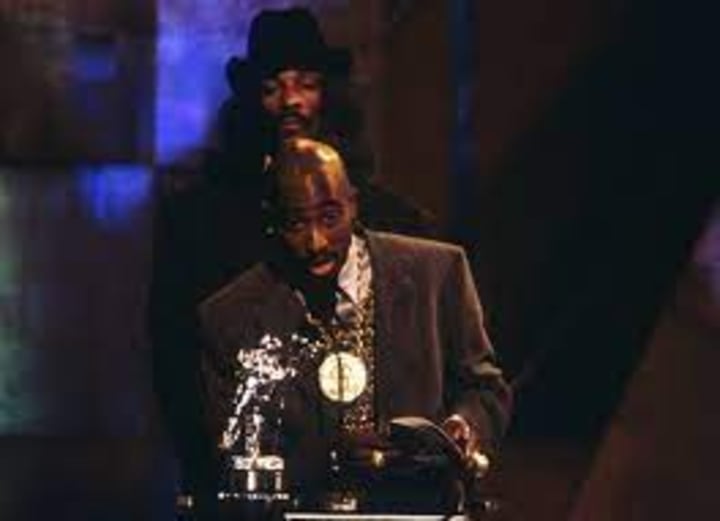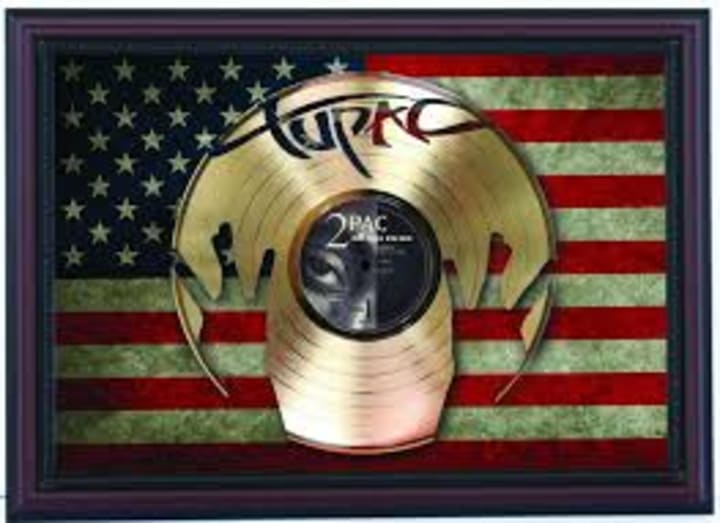The Tragic End of a Legend: The Story of Tupac Shakur's Death
A Story of Tupac Shakur

In the heart of East Harlem, New York, a legend was born on June 16, 1971. Tupac Amaru Shakur entered the world with a fire in his spirit that would later ignite the hearts of millions through his powerful words and soul-stirring music.
Growing up in a neighborhood rife with challenges, Tupac faced the harsh realities of poverty and violence. Despite the odds stacked against him, he was determined to rise above his circumstances and make a mark on the world. From a young age, Tupac exhibited a natural flair for performance, reciting poetry with an infectious rhythm that captivated everyone who heard him.
At the age of twelve, Tupac discovered his love for rap and hip-hop. It became his outlet—a means to express the pain, struggles, and dreams of his community. With a pen in his hand and emotions pouring out, he began crafting raw and authentic verses that reflected the realities of life in the inner city.
As a teenager, Tupac moved to Baltimore, where he faced even more challenges. Yet, it was there that he honed his skills and found his voice as an artist. His music became a beacon of hope for those who felt voiceless and forgotten. Through his lyrics, Tupac fearlessly tackled issues of racial inequality, social injustice, and the harsh realities of urban life.

In 1991, Tupac's talent caught the attention of music producer Shock G, who introduced him to the iconic hip-hop group Digital Underground. This encounter led to Tupac's first major break as a backup rapper and dancer. It was clear to everyone that Tupac was destined for greatness.
In 1991, Tupac released his debut album, "2Pacalypse Now," which was met with both praise and controversy due to its unapologetic portrayal of societal issues. He fearlessly confronted the challenges faced by the African American community, often drawing criticism from those uncomfortable with his candidness.
As Tupac's star continued to rise, so did his influence. He became more than just a rapper—he was a voice for the voiceless, a social commentator, and an advocate for change. His music resonated with people from all walks of life, transcending racial and cultural boundaries.

Despite his success, Tupac's life was not without turmoil. He found himself entangled in legal battles and faced accusations that further fueled his rebellious image. Yet, through it all, he remained true to his mission—using his platform to shed light on the issues that mattered most to him.
In 1995, Tupac's life took a tragic turn when he was shot multiple times during a robbery attempt in Las Vegas. Despite the severity of his injuries, Tupac survived, showing the world the indomitable spirit that defined him. However, the incident marked a turning point in his life, as he became increasingly aware of his own mortality.
On the evening of September 7, 1996, a fateful chain of events would forever change the course of hip-hop history. Tupac Shakur, the iconic rapper and social advocate, attended the Mike Tyson vs. Bruce Seldon boxing match at the MGM Grand Garden Arena in Las Vegas, Nevada. Little did anyone know that this night would mark the tragic end of a legendary artist's life.
After the boxing match, Tupac and his entourage left the arena and headed to Club 662, a popular nightclub in Las Vegas. The atmosphere was lively and celebratory, as fans and fellow celebrities flocked to the venue to revel in the electrifying atmosphere of the city.
As the night progressed, tensions escalated inside the club. Reports suggest that a scuffle broke out between Tupac's crew and another group. The reasons for the altercation remain unclear, but speculations have linked it to various conflicts in the hip-hop community at the time.
Amidst the chaos, a shocking turn of events unfolded. As Tupac and his entourage were leaving the club in their convoy of cars, a white Cadillac pulled up alongside them at a stoplight. From the window of the Cadillac, an unidentified assailant opened fire on Tupac's vehicle, spraying it with bullets.
Tupac was struck multiple times in the chest, arm, and thigh. Despite the severity of his injuries, he displayed remarkable strength and resilience. He managed to survive the initial attack and was rushed to the hospital for emergency medical attention.

For six days, Tupac fought for his life in the hospital's intensive care unit. The nation, and indeed the world, held its breath, hoping for a miracle that would spare the life of one of music's most influential and beloved artists.
On September 13, 1996, Tupac Shakur succumbed to his injuries and passed away at the young age of 25. The news of his death sent shockwaves throughout the music community and beyond, leaving millions of fans grief-stricken and heartbroken.
Tupac's death marked a tragic loss for not only the world of hip-hop but also for the broader sphere of social activism and artistic expression. He was more than just a rapper; he was a voice for the marginalized and a fearless advocate for justice and equality.
The circumstances surrounding Tupac's death have remained a subject of intense speculation and conspiracy theories over the years. Investigations into the shooting have been complex, hindered by the reluctance of witnesses to come forward and the lack of conclusive evidence.
Despite the passage of time, the impact of Tupac Shakur's artistry, activism, and unyielding spirit endures. His music continues to inspire, and his legacy lives on in the hearts of fans worldwide. Tupac's untimely death serves as a stark reminder of the fragility of life and the tragic consequences of violence.

In the years since his passing, tributes and memorials have been held in honor of Tupac Shakur. His influence on the music industry, social justice movements, and the lives of millions is a testament to the lasting impact of his legacy. Tupac may be gone, but his spirit lives on in every beat of his music and every word of his powerful lyrics, forever etched in the hearts and minds of those who loved and admired him.
About the Creator
Enjoyed the story? Support the Creator.
Subscribe for free to receive all their stories in your feed. You could also pledge your support or give them a one-off tip, letting them know you appreciate their work.






Comments
There are no comments for this story
Be the first to respond and start the conversation.